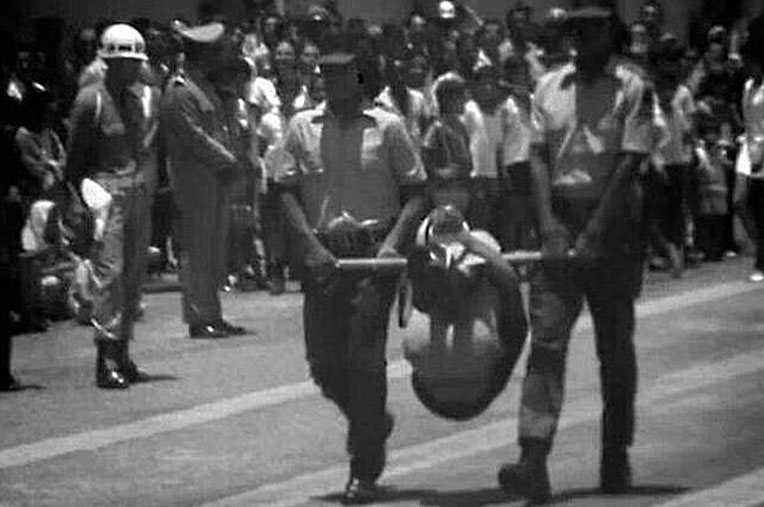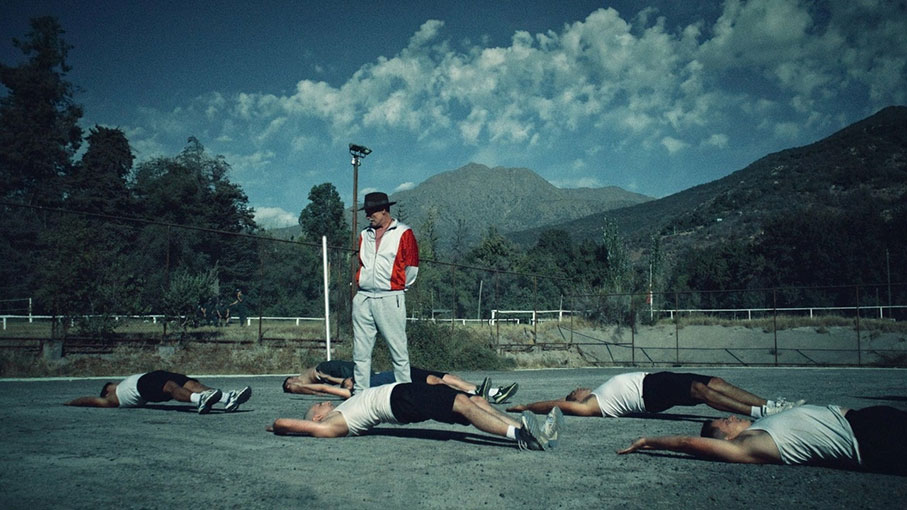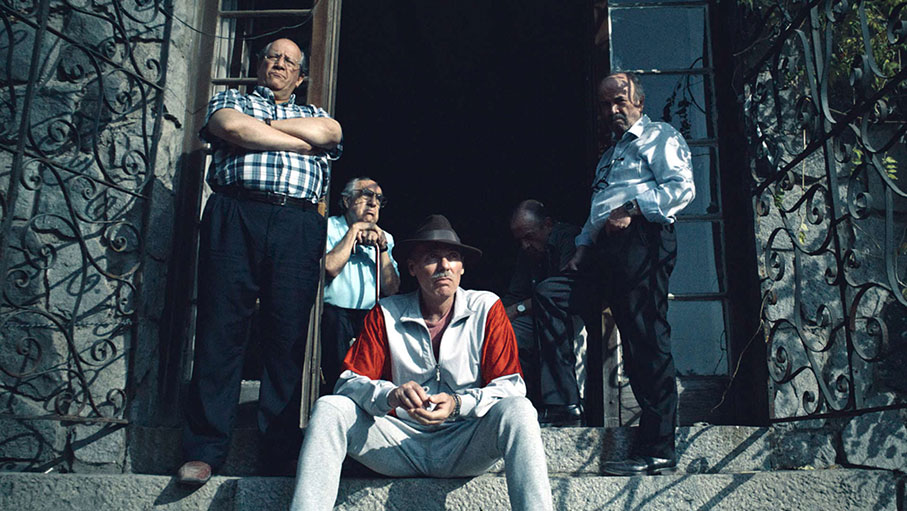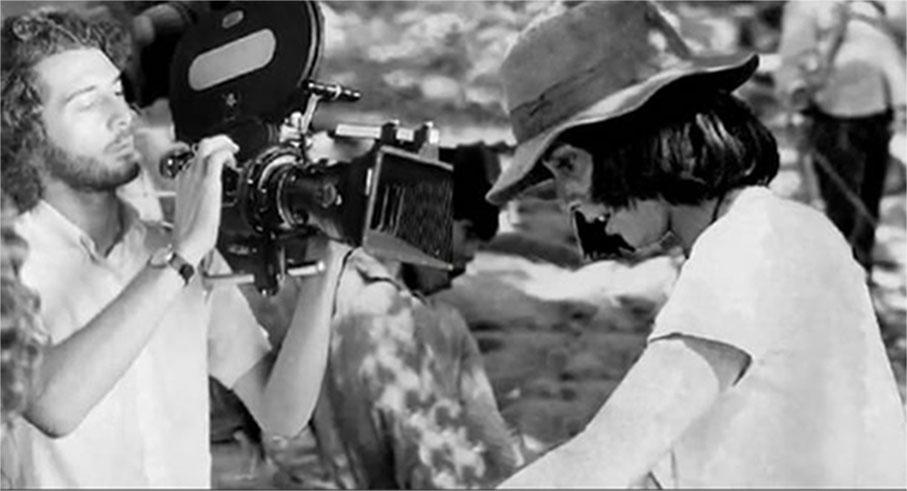|
There are many reasons for returning time and again, under the auspices of the British Film Institute and the London Film Festival, to Chile. To begin with, there's the sheer invention and quality of contemporary Chilean cinema and the myriad ways it finds of handling the same recurring themes. Scarcely a year goes by without that slither of an ineffably beautiful, if benighted country providing us with expertly executed films that tackle the dispiriting subject of the Pinochet coup and its aftermath. The tenacity of purpose and dogged resistance to the erasure of memory that suggests ultimately render this sub-genre of films as nourishing and satisfying as lucuma fresh from the Andes.
That such films often issue from Chile's darkest hour merely reminds us that hope shone brightest there once. Before Nixon ordered the CIA to 'make the Chilean economy scream', Allende's Popular Unity project seemed set to show that government of the people, by the people, for the people need not perish from the earth, even that it might ensure a country's copious natural resources enriched the many not the few.
Nixon, Kissinger and co. willed it otherwise. Pinochet's cohort of unhinged sadists obliged them by cutting Chilean democracy down in its prime, unleashing savage violence, and ushering in sorrow and the Chicago Boys. Chile, instead, became the birthplace of the rapacious neoliberal order that despoils the world to this day. It all began half a century ago, in Chile in 1973 - one of the pivot points not only of Chilean history but of all our histories, which is another yet reason to return to Chile.

Image courtesy of Jesco von Puttkamer.
Last year's London Film Festival served up three singular, salutary films [1976, Argentina 1985, My Imaginary Country] that hinted at certain chronological, if intertwined stages in the rise and fall of Latin American fascism. After each coup, murder and barbarism: arbitrary arrests, disappearances, extra-judicial executions, torture, rape, rape-as-torture, round-ups, savage repression, exile. The horror! Simultaneously, growing international outrage and crocodile tears in Washington. Later, once the local junta has consolidated its iron grip on power and established 'order': the systematic establishment of economic inequality, perpetuation of a pervasive atmosphere of chaos and confusion, fear and terror [1976].
Years, and many thousands of deaths later: a gradual adjustment to the shock of state violence, a tentative rise in resistance to caudillismo, an irrepressible growth in demands for justice. Next, a precarious period of democratic reawakening, a referendum or two, legal moves to hold those responsible for mass murder to account, commissions and tribunals, jail time for fascists [Argentina 1985]. Finally, the gradual re-emergence of those progressive energies originally supressed by fascism and early-stage recovery from the post-traumatic stress disorder suffered by those societies in America's backyard that'd had the temerity to challenge U.S. economic and imperial hegemony [My Imaginary Country].
If that schema paints too neat a picture of jagged historical processes still unfolding, it comes close to describing the arc of neoliberalism's growth spurts – concomitant with savage state terrorism and contingent upon the brutal interrogation and torture techniques taught at the CIA's School of the Americas (initially in Panama, then in Fort Benning), the formation of DINA and SIDE, the Dirty War and Operation Condor. Neoliberalism's advance was not, of course, halted by 'reconciliation', not by the Trial of the Juntas in Argentina, the National Truth Commission in Brazil, the Rettig and Valech reports in Chile, or any of the similar commissions across Latin American, but it's always heart-warming to see justice done.
Writer-director Felipe Carmona's thought-provoking and cumulatively powerful debut feature, Penal Cordillera, inserts itself toward the tail end of the above-mentioned processes, just before sentence was passed on Pinochet's barbarous top brass. This slow-burning film treats the depredations of dictatorship with oblique subtlety and asks what kind of people were responsible for the disappearances, the torture, the murder. Speaking to cineoutsider through his translator (Omar Zúñiga, one of the film's producers), Carmona said he sought to highlight the atrocities committed by the Pinochet regime while also addressing the simmering violence inherited by all Chileans and the dark tendencies that contend with decency within us all. That he achieves those aims in style while also contending with the questions of complicity, impunity, machismo, militarism, queer politics and overconsumption is testimony to Carmona's complexity of vision and the startling maturity with which he achieves it.

1993. Five elderly military men, key cogs in Pinochet's death machine all, await trial in comfort, at a remote mountain retreat where they are tended by prison guards who wait on them hand and foot. Among them, are Colonel Pedro Espinoza, Director of Operations of DINA, and General Manuel Contreras, the Head of DINA – a CIA 'paid asset' who was indicted on charges relating to the assassinations of both General Prats and Orlando Lettelier and who once said, 'It took me four years to pacify this country'. Collectively, the quisling quintet would be sentenced to many centuries of jail time. Contreras alone was sentenced to 500 years of imprisonment. In Carmona's creative imagining of events leading to their trials, Hugo Medina expertly plays Contreras - with an added edge. I reeled in shock when Carmona told me that Medina, who was active in Popular Unity and militant theatre in the Allende years, was himself detained and tortured by the junta between 1974-76, before being forced into exile in London for a decade. So, here we have an experienced actor who has undergone torture playing the man responsible for his torture.
If that background detail is chilling, so too are the uncanny similarities between the lush compound in which the five men are detained and Colonia Dignidad – the cultish community of German emigrants that contained an unknown number of Nazis who'd followed the 'ratlines' to Latin America in order to evade prosecution in the post-war period. This sinister enclave (which features in Florian Gallenberger's The Colony starring Emily Watson and Daniel Brühl) was a secluded settlement surrounded by barbed wire and watchtowers that operated as one of DINA's 'Joint Command' many torture and execution centres. Astonishingly, it was renamed Villa Baviera/Bavaria in 1991 and opened as a tourist resort - prompting victims of torture to attach photographs of the murdered and disappeared to its perimeter fence and compare the use of the site as a holiday camp to 'installing a McDonald's in Auschwitz'.
The five geriatric detainees of Carmona's creatively imagined prison-cum-holiday-camp dutifully take the tablets their guards solicitously provide. They are well fed, enjoy their respective hobbies (one keeps birds, another plays with his remote-controlled jeep, another collects rare books), and are even allowed visits to family. The wheel of habit slowly spins, the men while away their time with sports chatter; their days pass peacefully, marked only by visits from an oily intermediary who supplies items on their shopping lists. They are entertained on Independence Day. One of the prisoners, a Brigadier, puts his own guards through their physical paces. It is evident that the guards fear the five prisoners more than their own commander. Their uncertain or divided loyalties recall the fragile allegiance the Chilean military displayed when Allende called upon them to defend democracy against encroaching tyranny.

Despite these tensions of obedience, all is well with guards and prisoners alike, until one of the detainees gives an interview that is broadcast live. He displays no remorse for his disloyal actions and unthinkingly reveals details of their cosy conditions. The ensuing public outcry leads to curtailment of the prisoners' privileges. Like their many victims once were, they are cut off from the outside world. Finally, they are transferred to a friendly nation under cover of darkness. Carmona takes his time throughout, allowing events to gather and unfold with a steady hypnotic rhythm, building by degrees to a deeply disturbing climax that takes us deep into the heart of darkness.
Like Hugo Medina, Carmona began in theatre. Six years ago, he approached producers Omar Zúñiga and Dominga Sotomayor (who also produced Manuela Martelli's 1976) with the text of a play he'd directed and which they then developed, together, to make Penal Cordillera. Carmona's thespian training clearly helped him bring the best out of his brilliant cast, but he was amply supported by an equally experienced crew. Cinematographer Mauro Veloso insinuates a claustrophobic atmosphere by alternating between sepia interiors and dusky exteriors, Mariá Portugal's provides a soundtrack every bit as haunting as the one she prepared for 1976. Even the film's closing credits shine by dovetailing Portugal's elegiac Fado lament with T.S. Eliot's 1933 reading of 'The Wasteland' and fading into Ted Hughes's later reading of it.
Carmona displays a mature command of his filmic material - deftly feeding in cinephile references to films as various as Luis Buñuel's The Exterminating Angel, Claire Denis' Beau Travail, Marco Ferreri's La Grand Bouffle and Frances Ford Coppola's Apocalpyse Now. There are other, more poignant allusions to cinema associated with Penal Cordillera. Carmona dedicates his film to a young couple, Carmen Bueno and Jorge Müller, who met while working together on Patricio Guzman's The First Year. Müller was also the cinematographer on Guzman's legendary film The Battle of Chile, which is dedicated to him. Both Bueno and Müller were tortured and disappeared without trace in 1974.

Jorge Muller and Carmen Bueno
Restrained though Penal Cordillera is, it also explodes with visceral violence. The film's most profoundly disturbing scene, though, is one in. which violence is recalled not committed: three of the Pinochet loyalists nonchalantly, almost wistfully exchange notes on a few of the many they murdered and recount the methods of torture they deployed to despatch or break their victims: the dry submarine, the wet submarine, la parrilla (the grill), pau de arara (the parrot's perch), lethal injection.
With that single memorable sequence, Carmona sends us back on a loop to Saul Landau & Haskel Wexler's 1971 film Brazil: Report on Torture, but also forward to 1999, when Brazil's recently defeated President, Jair Bolsonaro, said, 'the pau de arara works. I'm in favour of torture... And the people are in favour as well. The five frail old men in Penal Cordillera embody the widespread slaughter of the Pinochet dictatorship, which itself acts as a cipher for Latin American fascism tout court, which in turn returns us to the origins of neoliberalism. We must never forget.
Patricio Guzman says, 'documentary is the critical conscience of a society. It represents the historical, ecological, artistic and political analysis of a society. A country without documentary cinema is like a family without a photograph album.' It might be argued that all cinema, fiction and non-fiction alike, performs such a documentary function. With Penal Cordillera, Felipe Carmona has certainly delivered another invaluable rebuke to wilful ignorance and contributed another urgent entry to Chile's impressive and increasingly essential archive of memory.
Recent polls found that the percentage of Chileans who believe the military acted correctly in carrying out the coup of 1973 increased from 16 per cent in 2013 to 36 per cent in 2023, while the percentage who believe coups are 'never justified' fell from 68 per cent to 41 per cent. Equally alarming is the recent recrudescence of the far-right in Chile in an increasingly polarised society. It's all to play for. As Miguel de Unamuno said, 'Memory is the shadow not of our past but of our future.'
|